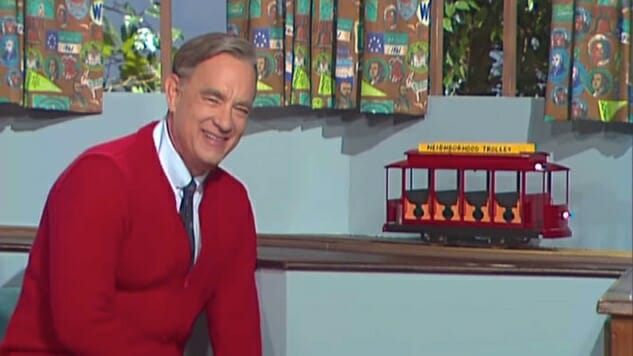A Beautiful Day in the Neighborhood Stubbornly Resists Being What You Think It Will Be

1. Before my screening of A Beautiful Day in the Neighborhood, not coincidentally on National Kindness Day, a local youth group stood in the front of the theater and sang “I’ll Be There.” A local radio DJ implored us to be good to one another. The publicist asked the audience “to be more like Mr. Rogers during these troubled times.” Then the youth group sang “Won’t You Be My Neighbor?” The mood was clearly set: This movie will make you feel good … and don’t you want to feel good? This is a lot of pressure to put on a movie—the world is on fire! But this movie will fix that!—and I’ll confess to starting to overdose on the saccharine, particularly when the studio security guy told us that Mr. Rogers wouldn’t want us to take out our phone during the screening. Was I about to watch a movie about a perfect saint? Who wants to watch a movie about a perfect saint?
2. One of the best things about A Beautiful Day in the Neighborhood is how stubbornly it resists what you think it is going to be. Sure, this isn’t an exposé of Fred Rogers: In this telling, he’s as kindly and pure as you expect him to be. But the film never lets that be the end of it. The easy piety of the public perception of Mr. Rogers, the idea that you can simply Be Kind and stick to that platitude and that will be enough, is one the movie roundly rejects. Rogers himself is elusive, mysterious, but he’s also palpable and tangible: He exists in our physical realm and runs into the same challenges the rest of us do, sees the same pain and strife as everyone else. The movie argues not that we should all be like Mr. Rogers, but that when tragedy hits us, and anger envelopes us, we must strive for grace wherever we can find it. In the film, that grace can be found in Mr. Rogers. But we must find it wherever we can. The movie is tougher, and more rigorous, and more interested in the hard work of healing than empty slogans. It is true to the spirit of Mr. Rogers without every deifying him. I bet he would have loved it.
3. It must be said that Mr. Rogers is not the main character of A Beautiful Day in the Neighborhood.. The protagonist is Lloyd Vogel (Matthew Rhys, playing a fictionalized version of writer Tom Junod), a highly successful magazine journalist and new father who is cynical about the world and crippled with rage at his alcoholic father (Chris Cooper) for leaving his mother when she was dying of cancer. His editor (a charming, much-missed Christine Lahti) assigns him a short 400-word profile for the magazine’s “Heroes” edition of Fred Rogers (Tom Hanks, of course), and the two men meet and talk. You think the film is going to go in a familiar direction from then on, with the cynic journalist having his heart warmed by the human kindness (that word again) of this American hero. And it does, a little. But the movie is more willing to get its hands dirty than that. It wants to put in the work.
-

-

-

-

-

-

-

-

-

-

-

-

-

-

-

-

-

-

-

-

-

-

-

-

-

-

-

-

-

-

-

-

-

-

-

-

-

-

-

-








































